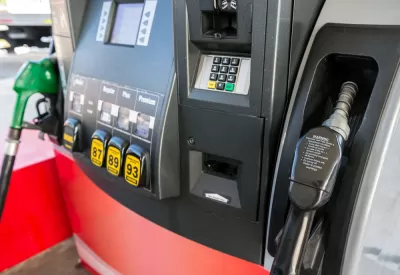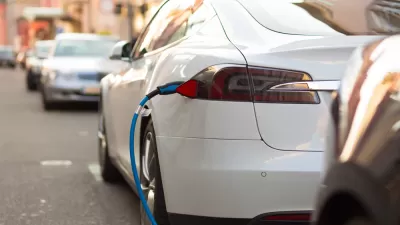Rep. Bill Shuster, who chairs the House Transportation and Infrastructure Committee, wants to hike gas and diesel taxes by 15 and 20 cents per gallon, respectively, add two new user fees on bicycles and electric vehicles, and test VMT fees.

Will the Shuster Infrastructure Proposal, released on July 23, fare better than the Trump infrastructure plan?
According to one report on the bill, the proposal "is very unlikely to become law but will add to the discussion regarding potential infrastructure legislation in 2019."
While the Trump plan centered on picking individual projects and expecting local, state, and private funds to pay for most of the cost, the proposal by the retiring Rep. Bill Shuster (R-Pa.) focuses on making the Federal Highway Trust Fund (HTF), projected to become insolvent in two years, a sustainable source of surface transportation infrastructure funding in the near term by hiking existing taxes, adding new ones, and eliminating tax breaks.
In the long term, it seeks to transform the HTF from a gas and diesel-tax sustained fund into one based on new user fees, presumably a vehicle miles traveled (VMT) fee, a.k.a. mileage-based user fee or road usage charge, the term used by the Oregon Department of Transportation for the nation's only operating program where motorists pay for each mile driven and are credited for state fuel taxes paid at the pump.
Ensuring near-term solvency
-
Hike the 18.4 cents per gallon gas tax and 24.4 cents per gallon diesel tax, unchanged since 1993, by 15 and 20 cents per gallon, respectively, over three years, and then index them to inflation. Taxes on alternative fuels would similarly be hiked by 82 percent.
-
Extend the Fixing America's Surface Transportation Act or "FAST Act" by one year through September 30, 2021. This is important because without reauthorization, the federal government can not continue to collect fuel taxes.
Highway Trust Fund Reform
"This proposal also recognizes that a number of surface transportation system users do not currently pay into the system, even though they benefit from it," states Shuster in the proposal's vision statement [pdf].
The proposal lays out a simple principle: if you are using the system in some manner, then you should help pay for it. Capturing all users of the system is a fair requirement which will benefit everyone.
New user fees and repeal of tax breaks outlined in the discussion draft [pdf]:
- Electric Vehicle Battery Excise Tax: Establishes a 10 percent user fee on the wholesale price of electric batteries used to propel motor vehicles.
- Bicycle Tire Tax: Establishes a 10 percent user fee on the wholesale price of bicycle tires used on adult bicycles.
- Eliminates a tax break on fuel purchased by transit agencies, but retains it for school buses.
- Reinstates the 4.3 cents per gallon user fee on diesel used by passenger trains.
Transition away from gas and diesel taxes
The proposal "establishes a national, volunteer-based pilot program to demonstrate whether a per-mile user fee can replace the existing user fees on gasoline and diesel, which are the primary sources of revenue for the HTF...The pilot program would be administered by the Secretary of Transportation, in coordination with the Secretary of the Treasury."
On Sept. 30, 2028, gas and diesel taxes would be eliminated, perhaps the most stunning part of the Shuster proposal. But would the road usage charge be ready to replace it? That would be determined by the new "Highway Trust Fund Commission of [15] experts established to study how best to achieve the long-term solvency of the HTF." The Commission would make a recommendation to Congress, but it "cannot propose to continue or adjust the gas and diesel taxes. An innovative solution must be proposed," according to the vision statement.
The Highway Transportation would "conduct a study on the nation’s highway system and submit a report on its findings by Jan. 15, 2021," reports Brett Samuels for The Hill. "Shuster, who is retiring when his current term ends, had previously indicated he would introduce a bill this summer."
"Notably, unlike the Trump Administration proposal, the draft does not include provisions that would allow for tolling, according to NATSO, formerly the National Association of Truck Stop Operators, a founding member of the Alliance for Toll-Free Interstates.
"Although many stakeholders -- including NATSO -- object to certain provisions in the draft legislation, it nonetheless represents an important continuation of -- and positive shift in -- the discussion President Trump started when he released his own infrastructure proposal earlier this year," writes David Fialkov in a comprehensive analysis of Shuster's proposal.
For more details, read the complete draft of the bill [pdf].
Hat tip to IBTTA SmartBrief.
FULL STORY: Shuster Releases Plan to Transform America’s Infrastructure

Study: Maui’s Plan to Convert Vacation Rentals to Long-Term Housing Could Cause Nearly $1 Billion Economic Loss
The plan would reduce visitor accommodation by 25,% resulting in 1,900 jobs lost.

Alabama: Trump Terminates Settlements for Black Communities Harmed By Raw Sewage
Trump deemed the landmark civil rights agreement “illegal DEI and environmental justice policy.”

North Texas Transit Leaders Tout Benefits of TOD for Growing Region
At a summit focused on transit-oriented development, policymakers discussed how North Texas’ expanded light rail system can serve as a tool for economic growth.

San Diego County Sees a Rise in Urban Coyotes
San Diego County experiences a rise in urban coyotes, as sightings become prevalent throughout its urban neighbourhoods and surrounding areas.

Los Angeles County Invests in Wildfire Recovery for Parks, Trails, and Open Space
The $4.25 million RESTORE Program supports the recovery of parks, trails, and open spaces damaged by the January 2025 wildfires through targeted grants that promote community healing, wildfire resilience, and equitable access to nature.

Nevada Bills Aim to Establish Home Insurance Assurance Amidst Wildfire Risk
Republican sponsor hopes the FAIR plan would be “a true market of last resort.”
Urban Design for Planners 1: Software Tools
This six-course series explores essential urban design concepts using open source software and equips planners with the tools they need to participate fully in the urban design process.
Planning for Universal Design
Learn the tools for implementing Universal Design in planning regulations.
Smith Gee Studio
Alamo Area Metropolitan Planning Organization
City of Santa Clarita
Institute for Housing and Urban Development Studies (IHS)
City of Grandview
Harvard GSD Executive Education
Toledo-Lucas County Plan Commissions
Salt Lake City
NYU Wagner Graduate School of Public Service




























